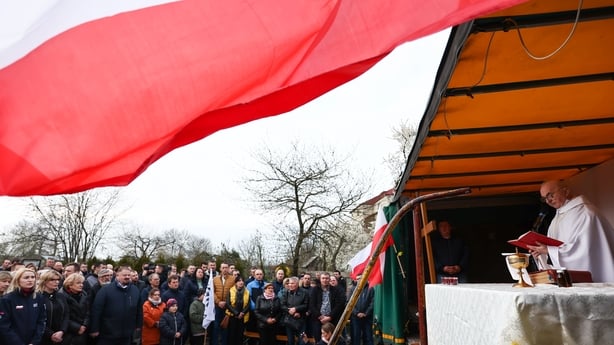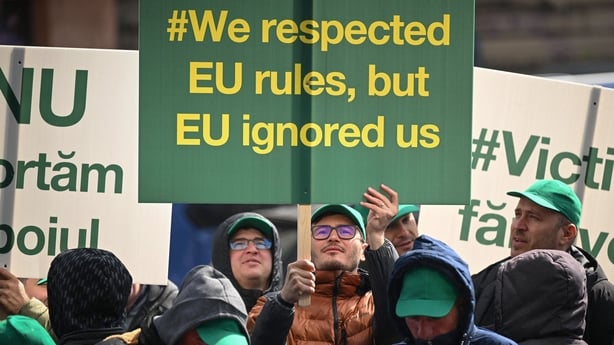The European Commission is continuing to negotiate with eastern EU member states to resolve a dispute over their move to ban Ukrainian food imports.
Poland, Hungary, Slovakia and Bulgaria introduced bans on imports of cheaper Ukrainian grain, oil seeds, dairy products and meat. Romania has so far held off on introducing a ban.
The European Commission condemned the ban by the four member states.
Since May 2022, the EU has provided Ukrainian foodstuffs with access to the bloc's common market. That access runs until the end of June and is widely expected to be extended for another year.
Poland, Hungary and Slovakia gave some ground last week when they agreed to allow the transit of Ukrainian grain through their countries.
But, Poland's development minister Waldemar Buda said in an interview yesterday that his country's embargo on Ukrainian grain imports would remain in place until at least the end of the year or "until the EU agrees to solutions at the European level".
Warsaw's awkward standoff with Kyiv over food imports goes against the government's otherwise staunch support for Ukraine's war effort.
"It's about big symbolism and big narratives for Law and Justice," Wojciech Przybylski, a political analyst, told RTÉ News, referring to the ruling right-wing party in Poland.
"That's why they have used such heavy guns on not such an important issue. This is driven by the fears of Law and Justice of losing the election," Mr Przybylski, the editor of Visegard Insight, said.
Poland faces a parliamentary election in October, one that is expected to be a tight-run affair.
Law and Justice has gained strong support from rural areas in past elections. Its main opponent for rural votes has been PSL, a farmers' party. But, in this year's election, it faces another challenger in the form of the extreme-right Confederation party.
Mr Przybylski said that, in recent months, Confederation "were deliberately compromising their agenda and standing side-by-side with farmers in protest against the government".

In recent weeks, Polish farmers staged a number of small-scale protests to complain about the impact of Ukrainian grain imports on local wholesale prices. Similar protests have taken place in Romania and Bulgaria.
Ukraine is one of the world's largest producers of grain and has traditionally exported foodstuffs, particularly cereals, via its Black Sea ports to north Africa and the Middle East.
However Russian forces occupy a large part of Ukraine's coastline and have blockaded the Black Sea with its fleet of warships.
That sent the traded price of wheat to skyrocket from about $8 per bushel (the standard global measurement for wheat - about 27kg) to $12 per bushel in the first few months of the war.
Prices have since stabilised and returned to pre-war levels.
Two key factors have helped this.
Firstly, a Turkish and UN-brokered deal last July enabled Ukraine to resume its exports of grain to developing countries from three of its Black Sea ports, including Odesa.
Secondly, the EU set up so-called "solidarity lanes" - rail and road routes in Ukraine's neighbouring EU countries through which Ukrainian foodstuffs are transported to ports in northern Poland and Romania.
But not all of the grain reached ports for re-export to north Africa and the Middle East.
A shortage of freight trains and trucks has been blamed for the failure to transport the grain.
An estimated three million tonnes of cheaper Ukrainian grain has remained in the Polish market since last summer according to NSZZ, a Polish farmers' union. A lot of that grain was sold locally, lowering the wholesale price of grain in the Polish market.
Michal Kolodziejczak, the young leader of AgroUnii, Poland's other farmers' union, told reporters last month that his union estimates that Polish farmers have lost 8 billion zloty (€1.75 billion) due to the impact of Ukrainian grain imports.

In late March, the prime ministers of Poland, Hungary, Slovakia, Bulgaria and Romania co-signed a letter to the European Commission requesting additional support for their agricultural sectors in light of the impact of Ukrainian food imports on their local market prices.
The issue appeared to have been resolved - at least in the Polish market - earlier this month when Ukraine's President Volodymyr Zelensky and Poland's Prime Minister Mateusz Morawiecki announced that they had reached an agreement to resolve the issue during the former's state visit to Warsaw.
That agreement did not last long.
The EU has so far offered €56 million in support from the €450m EU agricultural crisis fund to farmers in Poland, Romania and Bulgaria.







